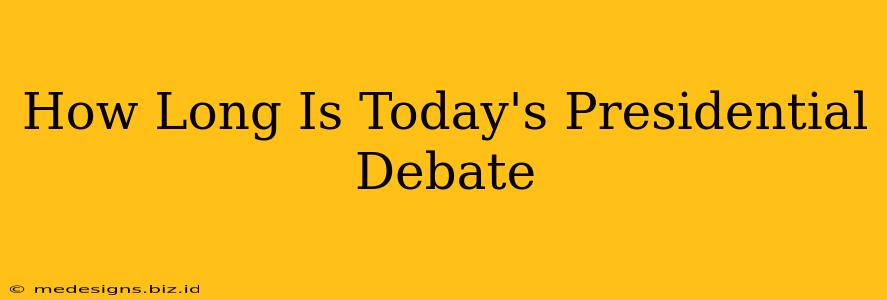The length of a presidential debate is a crucial factor for viewers, candidates, and the media alike. Knowing how much time is allocated allows for better planning and understanding of the flow of information. Unfortunately, there's no single answer to "How long is today's presidential debate?" as the duration varies depending on the specific debate and the rules set by the organizers.
Understanding Presidential Debate Formats
Presidential debates aren't simple free-for-alls. They follow a structured format, often including:
- Opening Statements: Each candidate gets a set amount of time to introduce themselves and their platform.
- Moderated Segments: A moderator poses questions, and candidates respond within allotted timeframes. These segments frequently focus on specific policy areas or current events.
- Candidate Rebuttals: Candidates may have opportunities to directly address points raised by their opponents.
- Closing Statements: Similar to opening statements, candidates summarize their key points at the end.
The overall time commitment is influenced by several things: the number of candidates, the complexity of the topics discussed, and the time allocated for each segment. Debates with more candidates tend to be longer to ensure each participant gets adequate speaking time.
Typical Debate Lengths: Past Examples and Expectations
While there's no standard length, past presidential debates have provided some insight into typical durations:
- 90-minute debates: This has been a common format in recent years, allowing for in-depth discussion on a range of topics.
- 60-minute debates: Shorter debates allow for a more focused discussion on fewer key issues.
- Variations: The exact timing can vary, sometimes including short breaks between segments.
To find the exact length of today's debate, consult the official schedule released by the debate commission or the news sources covering the event. This information will often be available well in advance. Keep an eye out for press releases and news articles leading up to the debate.
Why Debate Length Matters
The debate's length significantly impacts the information conveyed and the viewer experience:
- Shorter Debates: Might lead to less in-depth discussion, but also avoid audience fatigue.
- Longer Debates: Allow for a more thorough exploration of topics but may risk losing viewer attention.
Ultimately, the ideal length strikes a balance between detailed policy discussion and maintaining viewer engagement.
Beyond the Clock: Analyzing Debate Effectiveness
While the duration is important, it's only one aspect of a successful debate. Factors like the moderator's performance, the quality of questions, and the candidates' ability to articulate their positions also significantly influence the event's impact. Even a perfectly timed debate can fail to effectively communicate key policy positions or provide valuable insight for viewers.
Remember to check reliable news sources for the precise length and details of the current presidential debate. This will help you plan your viewing and understand the context of the political discussion unfolding.
